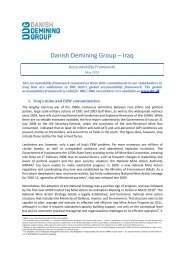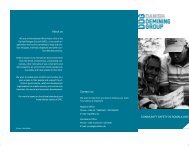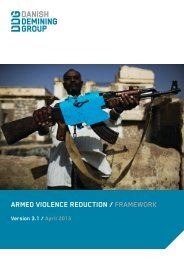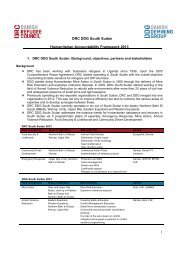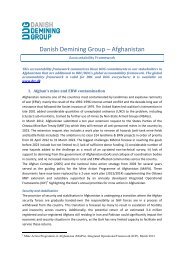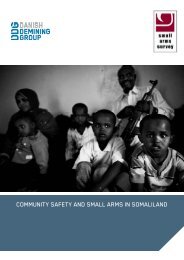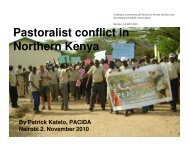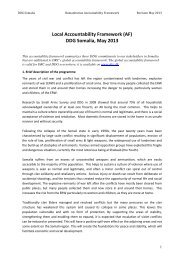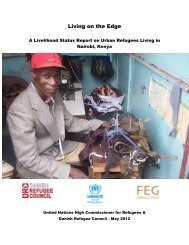Read the full report - Danish Refugee Council
Read the full report - Danish Refugee Council
Read the full report - Danish Refugee Council
Create successful ePaper yourself
Turn your PDF publications into a flip-book with our unique Google optimized e-Paper software.
CASH PROGRAMME REVIEW FOR IDPs IN KABUL INFORMAL SETTLEMENTS 551. Cash Approach for Winter Assistance for IDPs in <strong>the</strong> KISData collected for <strong>the</strong> survey showed food and fuel needs were mentioned as <strong>the</strong> primary needs ofrespondents during <strong>the</strong> winter; but that food remains <strong>the</strong>ir main spending priority despite provision ofin-kind assistance. Concern about health and affordability of health facilities was revealed to beparticularly high, with serious repercussions on morbidity and mortality in <strong>the</strong> winter time, and higherindebtedness. Interviews with local traders fur<strong>the</strong>r underlines <strong>the</strong>se items are those which are mostsubject to inflation of prices and lack of availability during <strong>the</strong> winter.Moreover, our survey and qualitative field work showed <strong>the</strong> stability of household’s income is deeplyimpacted by seasonal variations, with en unable to find sufficient employment opportunities andresorting to debt as a coping mechanism rising considerably in <strong>the</strong> winter period. In <strong>the</strong> winter, <strong>the</strong>situation of <strong>the</strong> KIS is one of emergency calling for short-term effective mechanisms relieving familiesfrom resorting to distress coping mechanisms. Several options can be considered:Anticipatory strategies: Winter is predictable and should not be addressed as a shock. Thefact that it is indicates high levels of vulnerability throughout <strong>the</strong> year. Preventive measuresincluding regular injection of cash over extended periods of time, activities promotinglivelihood, and sensitization about <strong>the</strong> use of cash can <strong>the</strong>refore be included as part ofroutine interventions to allow better resilience to shocks.Mix of food and non-food items: Due to inflationary prices of food and fuel and <strong>the</strong>ir lack ofavailability, cash-based programmes would gain in effectiveness and reduce risks of inflationby being combined with in-kind distribution of food and non-food items. In this regard, arecent Samuel Hall/WFP study 46 highlights that a mix of both cash vouchers and food is moreeffective in protecting families against <strong>the</strong> need to adopt austerity measures undermining<strong>the</strong>ir future livelihoods. Instead of adopting food depletion measures, food vouchersbeneficiaries borrow from friends and relatives purchase food on credit, and develop longertermrecovery strategies such as investment in health, education and repayment of debts. Itfur<strong>the</strong>r underlines that households who received both cash vouchers and food rations aremore likely to allocate a higher proportion of <strong>the</strong>ir resources to o<strong>the</strong>r needs – from livelihoodsto education and health, repayment of debts, clothing and transport.Understanding of seasonality: Given <strong>the</strong> labour market is non-functional or minimal in <strong>the</strong>winter period, cash-for work can be considered as ano<strong>the</strong>r way to temporarily inject cash inpoor households – in consultation with <strong>the</strong> communities’ and in accordance withgovernmental acceptability. Targeting productive members of <strong>the</strong> households is not an issuegiven <strong>the</strong> low risks of diversion from employment opportunities since those are low; and <strong>the</strong>redistribution practices inside <strong>the</strong> household <strong>report</strong>ed in <strong>the</strong> survey. Livelihood activities suchas vocational training activities, however, would be more efficient in o<strong>the</strong>r seasons, whendistress levels are lower.Health vouchers entitling beneficiaries to a free medical visit and free medication. Partnershipwith partner health NGOs active in <strong>the</strong> KIS to pay for a doctor/ private clinic to visit camps ona regular basis is an option that would ensure availability of services.2. Cash-based approach as a long-term solutionThe resilience and sustainability of livelihoods is a key to enable households to withstand shocks andstresses, move out of poverty and away from dependence on assistance. Injecting cash throughcash-based initiatives – whe<strong>the</strong>r direct cash grants or conditional cash approaches) can be anefficient way to ei<strong>the</strong>r permit beneficiaries to address <strong>the</strong>ir most urgent needs and mobilize <strong>the</strong>irassets for o<strong>the</strong>r activities, or to allocate <strong>the</strong>ir o<strong>the</strong>r resources to livelihood. To reduce <strong>the</strong>46 SAMUEL HALL CONSULTING (2013 upcoming), Cost effectiveness study, Commissioned by WFP Afghanistan.



